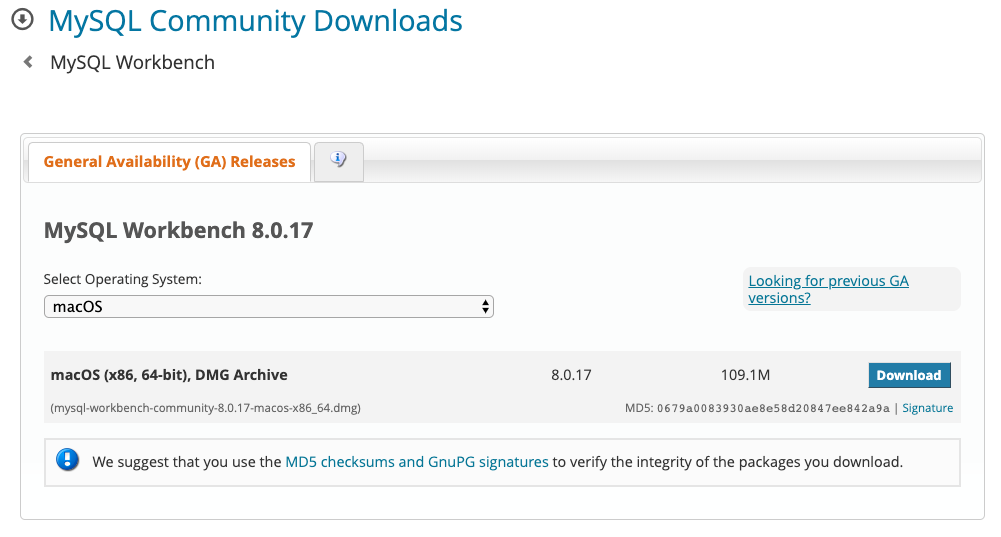:max_bytes(150000):strip_icc()/001-how-to-install-mysql-on-macos-4586389-f1d1cd0314de49378ac95c44db3d8f0e.jpg)
- MySQL MacOS X Catalina InnoDB Location of database file. November 15, 2020, at 08:00 AM. The standard location for the database is /usr/local/mysql/data but when.
- As you might know, the MySQL Community Edition is available for macOS. Usually, I install MySQL server on Linux server but this time, I want to try it on my Hackintosh macOS Catalina. Steps to Install MySQL Server on macOS Catalina Step 1. Download the MySQL Server installation package. Navigate to the following link to download your copy of.
- In this tutorial, I will show you how to setup/install Apache, PHP, and MySQL on macOS Catalina. Open the Terminal app and switch to the root user so you can run the commands in this post without any permission issues: 0001. Enable Apache on macOS.
Bug #101529: Despite notice that Catalina builds will run on Mojave, 8.0.22 will not: Submitted: 9 Nov 20:53: Modified: 11 Nov 7:44: Reporter: Toby Simmons.
Posted by: Paul Johnson
Date: October 14, 2020 09:34PM
Date: October 14, 2020 09:34PM
My directory structure is different than yours. What I'm surmising is that an error log created by MySQL would provide useful information. I'm using 'locate' to find files and directories containing mysql.
Anyway, I proceeded on a path related to an ownership issue:
I found this link:
https://stackoverflow.com/questions/41995912/macos-cant-start-mysql-server
On that page I found one post by Jack BeNimble suggesting the following ownership change:
sudo chown -R _mysql:wheel /usr/local/mysql/data
Being the gambler that I am, I tried it. (Changing group from _mysql to wheel)
Lo and behold, manually starting MySQL was successful using:
sudo /usr/local/mysql/support-files/mysql.server start
Elated, I moved back to the System Preferences for MySQL, and after happy feelings at seeing the two green dots (indicating success), I tried to stop MySQL by clicking on the button labelled 'Stop MySQL Server'. Sadly, it gave me the 'legacyLoader wants to make changes' message (to which I responded by entering my system password). This didn't stop MySQL.
So... I tried manually stopping MySQL in Terminal with:
sudo /usr/local/mysql/support-files/mysql.server stop
It worked! And in the System Preferences for MySQL, the red dots showed MySQL was down.
Now the problem has been reduced to the getting the 'Start/Stop MySQL Server' button to work.
Another ownership problem perhaps? Or maybe something more complicated because of changes in Catalina.
More fundamentally, why am I having these problems when I'm basically trying to do a vanilla install?
Anyway, I proceeded on a path related to an ownership issue:
I found this link:
https://stackoverflow.com/questions/41995912/macos-cant-start-mysql-server
On that page I found one post by Jack BeNimble suggesting the following ownership change:
sudo chown -R _mysql:wheel /usr/local/mysql/data
Being the gambler that I am, I tried it. (Changing group from _mysql to wheel)
Lo and behold, manually starting MySQL was successful using:
sudo /usr/local/mysql/support-files/mysql.server start
Elated, I moved back to the System Preferences for MySQL, and after happy feelings at seeing the two green dots (indicating success), I tried to stop MySQL by clicking on the button labelled 'Stop MySQL Server'. Sadly, it gave me the 'legacyLoader wants to make changes' message (to which I responded by entering my system password). This didn't stop MySQL.
So... I tried manually stopping MySQL in Terminal with:
sudo /usr/local/mysql/support-files/mysql.server stop
It worked! And in the System Preferences for MySQL, the red dots showed MySQL was down.
Now the problem has been reduced to the getting the 'Start/Stop MySQL Server' button to work.
Another ownership problem perhaps? Or maybe something more complicated because of changes in Catalina.
More fundamentally, why am I having these problems when I'm basically trying to do a vanilla install?
Options:Reply•Quote
Catalina Mysql Command Line
Written By

Brew Mysql Catalina

Sorry, only registered users may post in this forum.

Content reproduced on this site is the property of the respective copyright holders. It is not reviewed in advance by Oracle and does not necessarily represent the opinion of Oracle or any other party.